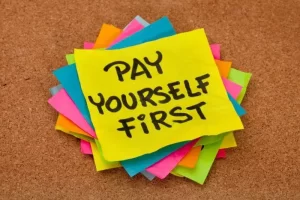Guide to Saving for Your First Move Out From Parents House
With financial instability abounding, young adults stay in their parent’s homes longer than ever.
Nevertheless, this doesn’t mean you can’t pursue your dream of independence and having your own place. If you plan ahead your monthly budget and ensure you have enough income, you can keep yourself afloat in your new life!
Follow along as we help you understand how much you should save to move out. Managing your expenses can be a bit overwhelming at first, but once you wrap your head around a personal budget that works, you could go through your monthly expenses and end up with extra money in your pocket!
Guide to Saving for Your First Move Out of Parents House
Moving out is more than just shipping your things away to a new space. Here are a few things that you should take care of before leaving home:
Set up pre authorised contributions to a saving account
A pre-authorized contribution to a savings account is a great way to put cash aside for your first move from your parent’s house. Here are the steps you can take:
Open a Savings Account

Let’s address the elephant in the room—you need enough money to cover your basic necessities for around three to six months.
You need to tackle your savings goals one step at a time, and having a savings account can be a good start to building your little fortune!
When choosing a bank, it’s always recommended to go for the one that offers higher interest rates without a minimum account balance. This way, you’ll save yourself tons of hidden costs in fees redacted when your balance goes below a set point.
Determine how much to save
Decide on a realistic amount you can regularly contribute to your savings.
Set up pre-authorized contributions
Contact your bank or financial advisor to set up a pre-authorised contribution transfer from your day-to-day checking account to your savings account for $50 or $100 monthly or biweekly.
Ensure you stick to the set contribution plan and avoid withdrawing money from your savings account at all costs unless it’s for an emergency. Ensure to stick to your budget and maintain the set monthly or biweekly savings plan.
Monitor saving progress
Keep track of your savings progress and adjust your contributions amounts upwards if necessary to speed up reaching your savings goal.
By creating monthly or biweekly pre-authorized contributions to your savings account, you can build a healthy savings habit and save enough cash to secure a first move from your parent’s house.
Practice 30-day rule
The 30-day rule is a personal finance guideline that suggests waiting 30 days before making non-essential purchases. The idea is to give yourself time to consider the decision of whether the purchase is necessary or if it is an impulse buy.
After 30 days, if you still want or need the item, you can go right ahead and buy it. The rule can help you avoid unnecessary costly spending, save money, and ensure you make more intentional purchases.
Secure a Steady Income

You can’t start saving without having a steady monthly income that covers your living expenses. It’s okay to start with an entry-level job and work your way from there.
Also, working on diversifying your income channels helps secure an emergency fund to help you quickly recover when trouble knocks on your doors.
Secure a safe debt-to-income ratio before deciding to move out. If this isn’t the case, there’s no shame in holding off the thought and working on improving your budgeting skills.
Moving out is supposed to be a step towards self-actualization and financial independence. If taking on such a step will be at the expense of getting you knee deeper in debt, it has already lost its purpose.
You can’t commit to a month-to-month lease with no money set aside for your other expenses.
Related
Work on Your Credit Score
Dropping the hard-earned cash you saved on a down payment for an apartment or hefty security deposits for rentals only makes sense after paying off your existing debts. Working to get your debts out of the way will also improve your credit history, so it’s a win-win!
It’s always wise to address your credit card debt one month at a time and ensure it never adds up. If you stick to such a budgeting strategy, you’re guaranteed to have a favourable credit score enough to get you through any background check.
Finance experts will also tell you to check your credit report often. This way, you can spot any errors and address them before they negatively impact your credit score.
Expenses to Bear in Mind When Moving Out

Here’s a list of expenses that you now have to keep in mind if you want to be independent:
Rent
Let’s start with the big one: you have to pay rent. A shocker, right? Welcome to adult life—you’ll pay a monthly rent to have a roof over your head. Your landlord will probably ask you to pay a security deposit before signing off the lease, which adds to your rental fees.
In some cases, you have to pay a fee to apply for a rental application, which quickly adds up if you’re reaching out to every vacant property around your location.
With the security deposit and essential rent expenses out of the way, you might consider some add-ons if you’ve got the cash for them.
A renter’s insurance could be a lifesaver in unexpected circumstances like theft or fire. Having rental insurance protects your property in such dire circumstances and allows you to get back on your feet in no time!
Compare different renter’s insurance plans and see which one has the best coverage and the lowest monthly fees. It’s one of the extra services you pay for, and I hope you never get to use it!
Moving Expenses
Moving out to your new studio apartment is stressful on its own, so having a moving company take over the process can free your mind from more pressing matters. Besides being more convenient, hiring one of the moving companies cuts down your transportation costs by a good margin.
Depending on how much stuff you’re taking with you, you can find good deals for moving amenities, so you don’t have to buy new furniture from the get-go.
Utilities
The cost of electricity, water, gas, and the internet is often added to your rent under utility deposits. If you have roommates, you can split the bills and bring down the total cost per person.
Food and Living Costs
With the utilities taken care of, you should also consider your other bills when planning your budget. These include subscriptions, cell phones, car insurance, and groceries.
You can adjust your spending according to your monthly needs. Nevertheless, you should accept that no matter how vigilant your efforts to save money are, you can’t cut corners on certain items.
For instance, if you’re running low on toilet paper, you’ll have to visit your local market and grab a roll or two. We’ve come full circle to how an emergency fund is a must, as you might face more pressing issues than running out of tissues!
Live life frugally
Look for ways to save money on essentials, such as shopping at discount stores and using coupons. A frugal lifestyle is a great way to save money when preparing to move away from your parent’s house. Here are other creative ways to live frugally to save cash on essentials:
Shop at discount stores

Look for discount stores in your area or wholesale clubs to save money on groceries, household items, and other essentials.
Use coupons
When grocery shopping, use coupons or look for bargain deals and discounts on items you want, such as food, toiletries and other necessities.
Buy in bulk
Buy non-perishable items in bulk, such as toilet paper or cleaning supplies; this helps you to save money in the long run.
Cook meals at home
Learn to cook simple meals at home instead of eating out, which can be expensive. A simple dinner at home can cost you $10; if purchased at a restaurant, the same meal can cost over $30 plus drinks; it even adds up more.
Use public transportation
Consider using public transportation like buses or trains. In addition, use carpooling when heading to work to save money on gas and car maintenance costs like a regular oil change.
A frugal lifestyle will help you reduce your monthly expenses and save more money, which can help you reach your goal of moving out of your parent’s house faster.
Wrapping Up – Guide to Saving for Your First Move Out
Congratulations! You’ve made it to the end of our guide to saving for your first move out. Moving out for the first time can also be an exciting but overwhelming experience, especially when managing your finances.
Having your own apartment is an exciting yet stressful idea! However, it doesn’t have to be this way if you plan your finances ahead and ensure you can afford to venture beyond your parents’ nest.
For this guide to saving for your first move out to work, you need to hold a steady job, have excellent budgeting skills and have a decent saving strategy to relieve the pressure of moving out! Popular side hustles as a gift!
































